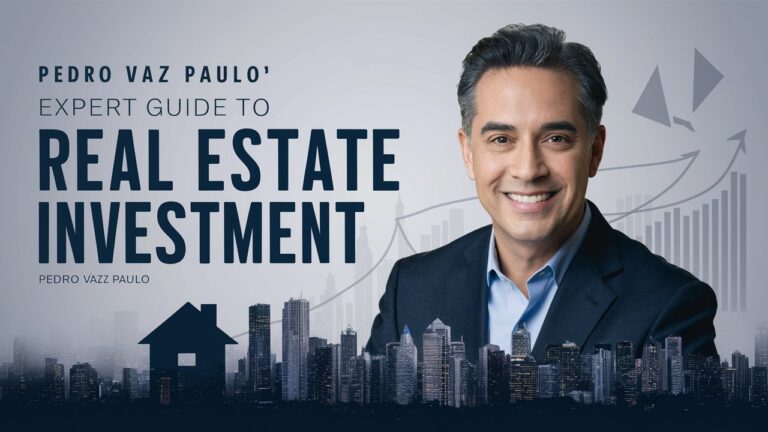Introduction
Real estate investment remains one of the most reliable pathways to wealth creation, but navigating its complexities requires expertise, foresight, and a strategic mindset. Pedro Vaz Paulo, a seasoned real estate investor and advisor, has built a reputation for transforming market insights into actionable strategies. With over two decades of experience, Pedro emphasizes the importance of adaptability, due diligence, and long-term planning in real estate ventures. This article delves into Pedro Vaz Paulo’s proven methodologies, explores key pillars of successful real estate investment, and answers frequently asked questions to equip both novice and seasoned investors with the tools to thrive.
Why Real Estate Investment Matters in Today’s Economy
In an era marked by economic volatility, real estate stands out as a tangible asset class that offers stability, passive income, and capital appreciation. Pedro Vaz Paulo often highlights that real estate’s intrinsic value—rooted in land scarcity and housing demand—makes it a hedge against inflation and market downturns. Unlike stocks or cryptocurrencies, properties provide multiple revenue streams: rental income, property appreciation, and tax benefits. Pedro stresses that understanding macroeconomic trends, such as urbanization rates and interest rate fluctuations, is critical for timing investments effectively. For instance, investing in emerging neighborhoods before infrastructure developments can yield exponential returns.
Pedro Vaz Paulo’s Core Principles for Successful Real Estate Investment
Pedro’s success stems from a disciplined adherence to foundational principles. First, due diligence: meticulously analyzing property histories, zoning laws, and local market conditions. Second, location prioritization: identifying areas with growth potential, such as proximity to transit hubs or tech hubs. Third, cash flow management: ensuring rental income exceeds expenses like mortgages, maintenance, and taxes. Fourth, long-term vision: avoiding speculative “flipping” in favor of sustainable growth. Pedro often cites his acquisition of a Lisbon commercial property in 2010—a neglected building revitalized into a mixed-use space—as a testament to patience and strategic reinvestment.
Analyzing Market Trends: Pedro Vaz Paulo’s Approach to Timing Investments
Timing is everything in real estate. Pedro advocates for a data-driven approach, combining quantitative metrics (e.g., vacancy rates, price-to-rent ratios) with qualitative insights (e.g., community development plans). For example, during the 2008 financial crisis, he identified undervalued properties in Porto, anticipating Portugal’s eventual tourism boom. Today, he monitors remote work trends to pinpoint demand for suburban homes and co-living spaces. Investors, he argues, must stay ahead of demographic shifts—such as millennial preferences for sustainable housing—and leverage tools like predictive analytics to forecast demand.
Diversification in Real Estate: Building a Resilient Portfolio
Pedro Vaz Paulo warns against overconcentration in a single property type or market. Diversification mitigates risk—a lesson he learned after a retail property investment suffered during the e-commerce surge. His portfolio now spans residential, industrial, and hospitality assets across Portugal, Spain, and Brazil. He also recommends exploring Real Estate Investment Trusts (REITs) for exposure to high-value markets without direct ownership. By balancing stable, income-generating properties (e.g., rental apartments) with high-growth opportunities (e.g., logistics warehouses), investors can weather economic cycles.

Risk Management Strategies Every Real Estate Investor Should Know
Risk is inherent in real estate, but Pedro’s strategies minimize exposure. Insurance: Comprehensive coverage for natural disasters, liability, and rent defaults. Financial buffers: Maintaining reserves for vacancies or repairs. Legal safeguards: Partnering with attorneys to navigate lease agreements and regulatory compliance. Pedro also emphasizes exit strategies—knowing when to sell, refinance, or repurpose underperforming assets. For instance, converting an outdated office building into co-working spaces can revive its profitability.
Case Study: Pedro Vaz Paulo’s Most Notable Real Estate Investment
In 2017, Pedro acquired a dilapidated warehouse in Lisbon’s Marvila district, then an industrial zone. Recognizing the area’s potential as a cultural hub, he transformed the space into a hybrid art gallery and co-working venue. Today, Marvila is a hotspot for startups and creatives, with property values tripling. This project underscores his philosophy: “Invest where others overlook, but always validate with data.”
The Future of Real Estate Investment: Pedro Vaz Paulo’s Predictions
Pedro anticipates several trends reshaping real estate: 1. Technology integration: AI-powered property management and virtual tours. 2. Sustainability: Green buildings commanding premium rents. 3. Urban decentralization: Suburban and secondary cities gaining traction as remote work persists. He advises investors to align with ESG (Environmental, Social, Governance) standards and explore proptech innovations to stay competitive.
Conclusion
Real estate investment, when approached with Pedro Vaz Paulo’s blend of rigor and creativity, offers unparalleled opportunities for wealth generation. By prioritizing due diligence, diversification, and adaptive strategies, investors can navigate market shifts and capitalize on emerging trends. Whether you’re eyeing residential properties or commercial ventures, Pedro’s insights provide a roadmap to turning real estate into a cornerstone of financial freedom.
Frequently Asked Questions (FAQs)
1. How do I start investing in real estate with limited capital?
Pedro recommends starting small: consider REITs, crowdfunding platforms, or joint ventures. Focus on markets with low entry barriers and high rental demand.
2. What’s the ideal holding period for a real estate investment?
While flipping can yield quick returns, Pedro advocates a 5–10-year horizon to benefit from appreciation and compounded rental income.
3. How does inflation impact real estate investments?
Real estate often thrives during inflation, as property values and rents rise alongside living costs, preserving purchasing power.
4. What are common pitfalls to avoid?
Overleveraging, neglecting maintenance costs, and underestimating vacancy rates. Always model worst-case scenarios.
5. Is international real estate investment advisable?
Yes, but partner with local experts to navigate regulations and cultural nuances. Pedro’s ventures in Brazil and Spain exemplify this approach.
By integrating Pedro Vaz Paulo’s strategies, investors can transform real estate from a speculative gamble into a calculated, rewarding journey.
